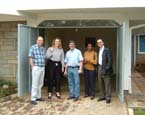Information for All: The Sudan Radio Service (SRS)
June 2003, Nairobi
More than twenty years of cyclical conflict has taken its toll on the lives of Sudanese people. The Machakos Peace Process, now in its sixth session, is attempting to resolve disputes between the North and South and begin a process of reconstruction. Sudan, characterized by arid lands in the North and a mix of agrarian communities and nomadic herders in the South, is also an area with little access to regular, impartial news. The pieces of news people do receive come from sporadic BBC broadcasts and reports spun out from political groups. Until now, unbiased, independent radio has not been available and consequently people’s knowledge of their country’s Peace Process has been compromised.
With support from USAID’s Office of Transition Initiatives (OTI), the Sudan Independent Radio Service (SRS) was developed by the Education Development Center through the dot-EDU initiative. The SRS will provide Sudanese living in the country and in the East African region with information containing no bias toward race, nationality, religious or political affiliation, opinion or gender. Strict political neutrality and independence in program development and partner selection are its credos. Multilingual programming in at least eight languages (Dinka, Bari, Nuer, Zande, Shiluck, Arabic, Juba-Arabic and English) will increase its reach, and subjects like nutrition, civic rights, agriculture and culture will promote livelihood improvement. Furthermore, non-governmental organizations working in Southern Sudan will be able to use this radio service to provide information and training to the disparate population.

Staff members in front of the Nairobi office
However, such good ideas are not without their challenges. According to the Chief of Party for EDC based in Nairobi, the primary constraints on information flow in the region are “the scarcity of communications and transport, illiteracy and the societal control exercised by political groups”. The lack of media infrastructure has not allowed qualified people or potential producers to utilize and build skills in radio. Due to unstable conditions in Sudan, EDC is establishing an office in Kenya in the interim. The SRS will be transferred to Sudanese ownership once sufficient capacity is built and local conditions are favorable.
As EDC works to establish its Nairobi offices, they’ll begin broadcasting from Washington D.C. via an international, short wave transmitter that will reach much of East Africa, including Tunisia, Egypt and Madagascar. Jeremy Groce, Nairobi-based EDC Radio Programming Advisor provides the rationale: “Even though we’re not entirely ready to start programs in Nairobi, we feel it’s important to stick to our timeline in order to provide some news about the Sudan Peace Process and other issues of importance to Sudanese people. We also need to begin building our audience, and with short wave radio it can take time.”
As for personnel needs in Kenya, Lisa Slifer of EDC explains: “We will recruit two to three key Sudanese radio producers as we start up this new service. At the same time, we’re going to the Sudanese community in Nairobi to recruit people and train them in media production and journalism. Stringers within Sudan will also provide in-country, up-to-date information.” Building local capacities in radio production is an integral part of the SRS’ long-term sustainability, as is the establishment of a high quality production facility.
The SRS is establishing a Board of Trustees and has already developed a scope of work for the producers, administrative and marketing staff. Equipment is on its way to Kenya and training is soon to follow. If successful, the SIRS broadcasts may make the most significant near term impact on the capacity of Sudanese to improve their livelihoods.
For more information, please contact:
- Kent Noel, Project Director, knoel@edc.org
- Jeremy Groce, Chief of Party and Radio Programming Advisor, jgroce@edc.org
- Abdenour Boukamhi, Project Coordinator, aboukamhi@edc.org
